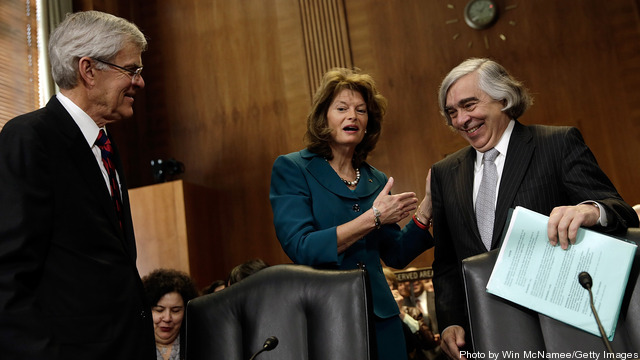
The IRS has clarified the “under construction” provision in the production tax credit.
Some good news from the IRS on April 15. Keep reading →

The IRS has clarified the “under construction” provision in the production tax credit.
Some good news from the IRS on April 15. Keep reading →

Devon Energy chief executive John Richels is confident that US President Barack Obama’s administration will approve the the Keystone XL pipeline, but he expects the gap between prices for Canadian heavy oil and US benchmark West Texas Intermediate (WTI) to narrow even if the pipeline never gets built.
“Keystone XL is going to be approved,” Richels told attendees of the Independent Petroleum Association of America’s Oil and Gas Investment Symposium in New York on Tuesday. “From a national point of view it makes no sense for the President not to approve that, and buy more oil from Venezuela and the Middle East.” The Keystone XL pipeline, as envisaged, would transport up to 830,000 barrels per day of Canadian oil from Alberta to US refineries. Keep reading →

One of the largest independent natural gas producers in the US, Southwestern Energy, is optimistic about the US natural gas industry outlook despite anticipated cost increases associated with upcoming EPA rulemaking.
Southwestern President and CEO Steve Mueller said his company was not concerned about fracking regulations, but described methane emissions as a “big concern” when fielding questions from Wall Street analysts at the Independent Petroleum Association of America’s Oil & Gas Investment Symposium in New York on Monday. Keep reading →

President Obama’s nominee to lead the Department of Energy, Ernest Moniz, dealt with questions about LNG exports from both sides of the aisle during his Senate Committee on Energy and Natural Resources hearing held Tuesday April 9th.
If confirmed, which is widely expected, Moniz would be in charge of the department responsible for issuing some of the permits needed to export LNG from the US. He previously supported exports in a co-chaired 2011 MIT report entitled “The Future of Natural Gas,” which concluded “The U.S. should sustain North American energy market integration and support development of a global ‘liquid’ natural gas market with diversity of supply. A corollary is that the U.S. should not erect barriers to natural gas imports or exports.” Keep reading →

Here are some interesting energy-related tid bits making the rounds this week.
Iran Moving Beyond Oil Keep reading →

Even with well-established forms of energy development like oil and gas, the science on impacts to the environment can be hard to quantify and harder to predict. The challenge for sectors like the wind industry – comparatively new in its current form – are even higher given the lack of operational data, but as in other areas, the wind business is sprinting to get ahead.
A number of wind energy industry leaders joined several years ago with major environmental groups to form the American Wind Wildlife Institute, which plays several roles but represents an early effort by the sector to be certain wind energy development remains attractive while assuaging or minimizing concerns about impacts on wildlife. Keep reading →

EPA’s Science Advisory Board will form an independent panel to provide transparent feedback on its 2014 draft report on hydraulic fracturing and its impact on drinking water resources.
On March 25, 2013, the Environmental Protection Agency’s (EPA’s) independent Science Advisory Board announced formation of a panel of independent experts to review the agency’s hydraulic fracturing research report,which is to be completed in 2014. The 31-member Hydraulic Fracturing Research Advisory Panel will review and provide scientific research on the EPA’s Congressionally-mandated draft report on the potential impacts of fracturing on drinking water. Keep reading →

One of the biggest ignored threats to the power sector – and to electricity delivery to homes and businesses across much of the country’s most populated regions – is from a lack of natural gas pipeline capacity. A former federal regulator is warning that this issue, arcane at first glance, could prompt market failure and a crisis of reliability for some generators.
The free market is a funny thing; it works only over time and often in socially unpopular ways. The energy market in the US has been regulated, de-regulated and re-regulated over its history, but all market participants are operating in the context of rules set up to balance policy priorities and operating realities. Keep reading →

In this video, the US Department of Interior highlights outgoing Secretary Salazar touring five new national monuments designated by President Obama; the Secretary bids an emotional farewell at a ceremony at the Department of the Interior; and the Obama Administration releases a new national strategy to fight climate change by preserving our natural resources.
Salazar is stepping down and President Obama has nominated Sally Jewell to take his place. Jewell is president and chief executive of outdoor recreation company REI and worked as an oil field engineer earlier in her career. The Department manages the country’s energy resources located on federal lands both onshore and offshore. Keep reading →

Exxon Mobil was working to clean up thousands of barrels of oil in Mayflower, Arkansas, after a pipeline carrying heavy Canadian crude ruptured, a major spill likely to stoke debate over transporting Canada’s oil to the United States.
Exxon shut the Pegasus pipeline, which can carry more than 90,000 barrels per day (bpd) of crude oil from Pakota, Illinois, to Nederland, Texas, after the leak was discovered on Friday afternoon, the company said in a statement. Keep reading →
